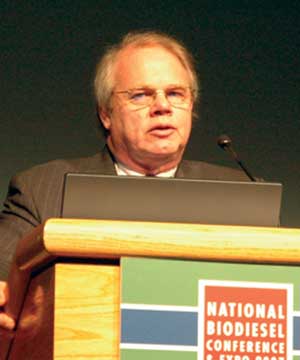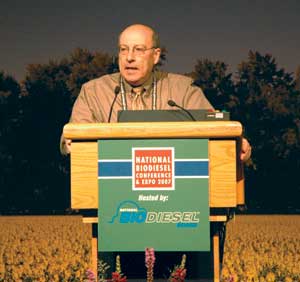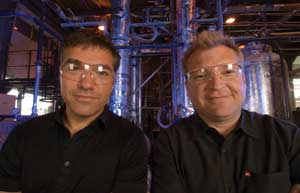April 2007
 View Full Print Edition
View Full Print EditionBusiness Briefs
Columns
The Way I See It
By Mike Bryan
View From the Hill
By Bob Dinneen
NBB In Sight
By Joe Jobe

Editor's Note
By Tom Bryan

Legal Perspective
By Todd J. Guerrero
Featured

Moving Beyond Grain
By Lindsey Irwin
Lansing Trade Group LLC is one of the five oldest, continuously active members of the National Grain and Feed Association and is well-established within the grain trading industry. The company's experience and reputation have allowed it to easily expand into the merchandising of ethanol and distillers grains.

Of Mice, Men and in situ
By Ron Kotrba
The means already exist for the production of biodiesel using low-value corn oil extracted from the back end of an ethanol plant. If science was content with existing technologies, however, we'd all be reading by candlelight and salting our meat well before we planned to eat.

Growing Forests of Fuel
By Nicholas Zeman
ArborGen LLC is a leader in the research and development of applications in genetics aimed to commercialize and reduce the cost of producing cellulosic ethanol from woody materials. Although controversial, ArborGen believes that the use of genetically modified stands of trees for industrial purposes will allow for greater conservation of native forests.

Ethanol and the Farm Bill
By Susanne Retka Schill
The outlook for ethanol in the 2007 Farm Bill is looking good—if the money to fund the energy proposals can be found. To get a better idea of what could come out of the Farm Bill discussions, EPM reviewed some of the proposals brought forth by the USDA and other stakeholders.

FEW Returns to its Roots
By Jan Tellmann
The energy pulsing through the ethanol industry today is reflected in the sheer number of people expected to attend the 2007 International Fuel Ethanol Workshop & Expo. The event will be held in St. Louis, where 23 years ago, just 40 people gathered to talk shop. Last year, the annual event drew more than 3,000, and this year it promises maintain its reign as the largest ethanol event on Earth with an anticipated attendance of nearly 5,000.

Wide Depth of Field
By Jan Tellmann
Mascoma Corp. has set its sights on a variety of feedstocks to complete its mission—develop a simple, cost-efficient process to commercially produce cellulosic ethanol. The company is considering everything from grass and wood to agricultural and forestry waste to fuel its ventures, the first of which will be a demonstration-scale facility in New York.
Redirecting Oil Subsidies
By Anduin Kirkbride McElroy
When gasoline prices were at record-high levels and oil companies were making record profits, as well as collecting billions in subsidies, consumers saw red. To show their constituents that they feel their pain, and to decrease the nation's dependence on foreign oil, some in Congress are proposing to redirect subsidies paid to gas and oil companies to support renewable energy.

On a New Track
By Michael Shirek
With tougher federal emissions standards on the horizon and an aging fleet of diesel-electric locomotives, could the ethanol-hybrid locomotive become the next American railroad workhorse?

The Power of Partnering
By Bryan Sims
A trend toward mergers and joint ventures has emerged as the competition to be the first to commercially produce cellulosic ethanol heats up. Partnerships help companies obtain the necessary resources and spread out the risks associated with the building of a new industry.

NBB Raises the Bar
By Susanne Retka Schill, Jan Tellmann and Lindsey Irwin
In the shadow of the Alamo where brave defenders of Texas desperately fought to hold their ground against insurmountable odds, supporters of the biodiesel industry gathered for the National Biodiesel Conference & Expo. Although their struggle isn't as legendary nor their sacrifices as ultimate, a great deal of effort has been exerted by many to move the biodiesel industry to its current production level.

ASTM has Real-World Consequences
By Jerry W. Kram
Meeting ASTM specifications for biodiesel may become even more like a stamp of approval. Producers who allow off-spec biodiesel into the market could not only jeopardize their reputations, but they could also run afoul of the U.S. EPA and the Internal Revenue Service. With an unacceptably high number of biodiesel samples not meeting ASTM standards in a recent survey, the entire industry could be on the receiving end of a consumer backlash that could take decades to recover from.

Shining Examples
By Michael Shirek
Until federal regulations are established, the burden of ensuring biodiesel quality rests at the state level. Individual states have to meet the growing use of the fuel with their own regulations, which has led to inconsistent standards and testing methods across the nation. Although 27 states have accepted the ASTM D 6751 standard for B100 and 14 have applied ASTM D 975 specifications to blended biodiesel, only 12 states proactively test biodiesel samples for quality before the fuel goes to market.

Permit Pending
By Anduin Kirkbride McElroy
The complicated and overlapping process of obtaining the proper permits to build and operate a biodiesel plant can be confusing at best. To make the process more manageable some projects rely on regulatory professionals, who can offer experience, foresight and perspective to avoid costly delays and fines.
A Full-Service Package
By Nicholas Zeman
Fuel storage practices are critical to ensuring a quality supply, and because biodiesel can degrade rapidly through oxidation, the shelf life of the fuel is viewed as a weakness. However, a new product from Eastman Chemical Company is now available that may be the most developed additive technology to date for increasing oxidative stability.

Growing an Industry Counterculture
By Ron Kotrba
There is something to be said about a company's overall business plan when it alone justifies how one of the largest investment arrangements in biodiesel history was recently finalized. Imperium Renewables is the name, energy production is its game.
Contributions

The New Math: Ethanol Production with Steam from Nuclear Plants
By Samuel Rosenbloom, Charles W. Forsberg and Gregory
The Role of Sterol Glucosides on Filter Plugging
By Inmok Lee, Lisa M. Pfalzgraf, George B. Poppe, Erica Powers and Troy Haines
















